- Home
- Leslie Meier
Birthday Party Murder Page 12
Birthday Party Murder Read online
Page 12
“Lucy, sit down,” invited Bonnie. “Can I give you something to eat? A Coke?”
“No, no. I’ll only be a minute. I don’t want to hold up your dinner. It’s just that I’ve been asked to look into Sherman Cobb’s death—Bob Goodman doesn’t believe it was suicide, you know.”
“I know,” said Howie. He didn’t bother to hide his disapproval.
Lucy plunged ahead. “Anyway, I know you were on patrol the night he died and I wondered if you saw anything unusual.”
“You could say that,” replied Howie, and Lucy’s hopes rose. “I won’t forget that night any time soon.”
This was much better than she had expected. “What happened?” she asked eagerly.
“That’s the night that tractor trailer slid off the exit ramp out on the interstate. What a mess. Eggs everywhere. I was called out there to help direct traffic.”
Lucy tried not to show her disappointment.
“So you weren’t even here in town?”
“No, ma’am. I was out there all night while they cleaned up the mess. It was one hell of a night.”
Lucy rose to go. “What about Bob Wickes? He started at eleven. Do you think he might’ve seen anything?”
Howie shrugged. “You’d have to ask him, but you can’t talk to him until Monday. He’s in Orlando with the whole family.”
“Thanks for your help.” She smiled at Trevor and Hunter. “Bye, boys.”
“Now, what do you say?” prompted Howie.
“Good-bye. Thanks for coming,” they chorused.
Lucy’s smile vanished as soon as she was out the door. Another lead fizzled, another dead end in this investigation that was going absolutely nowhere. No wonder the police were calling it a suicide.
And even worse, she was going to have to tell Bill about Toby’s difficulties at college. What she wouldn’t give, she thought as she started the car, to go back in time about fifteen years. Back when Toby and Elizabeth were five and three—and she was every bit as pretty and perky as Bonnie Kodak.
Chapter Fifteen
Taking her cue from an article she’d read in a women’s magazine, Lucy chose her moment to deliver the bad news about Toby. She was on her way out the door on Wednesday, deadline day, and had little time to spare.
“Oh, by the way,” she said, as she buttoned her coat, “Toby called me at work yesterday.”
Bill’s eyebrows shot up. “He did? That’s kind of unusual, isn’t it? Is something the matter?”
“He said he’s worried about his grades.” Lucy was pulling on her gloves. “He doesn’t think they’re going to be very good. Sounded pretty bad, actually.”
“What did you tell him?” asked Bill, as Lucy opened the door.
She was on the porch. “I told him to stop partying and get his ass to class,” she said, giving him a little wave. She was halfway down the driveway when she caught sight of Bill in the rearview mirror, still standing in the doorway.
Arriving at The Pennysaver, Lucy was soon caught up in the rush to beat deadline. She was surprised when she looked up from the page she was proofreading and saw Sue.
“What are you doing here?” she asked.
“We have a date, remember? We’re going to see Miss Tilley.”
“Right, right. I’m almost done.”
“I’ll wait,” said Sue, taking a seat and giving Ted a big smile.
“I saw Pam at the IGA,” she told him. “I hope you like chicken. They’re on sale and she was buying a lot of them. I guess she must be going to freeze them. I didn’t know you have a freezer. When did you get it, Ted?”
Ted gave her a blank look, grunted, and started searching through a stack of papers.
“Is he always this sociable?” asked Sue, turning to Phyllis. “You’ll never guess who else I saw at the IGA. Your cousin.”
Phyllis was flipping through the phone book, checking on a number.
“You know, Elfrida! She’s just back from a week in the Caribbean. She looks great. She got a terrific tan. Says she never burns, lucky girl.”
Phyllis closed the book and went back to her computer.
Sue let out a big sigh. “How much longer do you think you’re going to be, Lucy?”
Lucy looked at Ted.
“Go,” he said.
“Are you sure?”
“We’ll get done faster if you get her out of here,” he said.
“Am I interrupting you?” Sue’s eyes were round. “It didn’t look as if you were doing anything important.”
“Go, go.” Ted shooed them with his hand.
“Well, I must say, that wasn’t very nice,” fumed Sue, pausing on the sidewalk while Lucy fumbled with her coat.
“It’s always a little tense just before deadline,” explained Lucy. “We have to make sure there aren’t any mistakes.”
“Right.” Sue laughed. “Like there are never any mistakes in The Pennysaver.”
“Well, we try,” insisted Lucy, climbing up to perch beside Sue in her big SUV.
When Lucy and Sue knocked on Miss Tilley’s door, it was Shirley who answered. She didn’t invite them in, but placed herself squarely in the doorway.
“Where’s Rachel?” Lucy blurted out the words, then realized how rude they sounded. “I’m sorry, Shirley. It’s lovely to see you again. I was just surprised because Rachel always answers the door.”
“Rachel’s doing errands, so I said I’d stay home with Auntie.”
“Isn’t that nice,” said Sue, in a brisk, businesslike tone. “We’re here to see your aunt. I called yesterday and she’s expecting us.”
Shirley didn’t move. “Actually, it might be better if you came back later. She’s resting now.”
Sue rose to the challenge. Raising her voice, she said, “She’s expecting us, and I’m sure she would be disappointed to miss us.”
“Who’s there?” It was Miss Tilley. “Is it Lucy and Sue?”
Defeated, Shirley turned aside and Sue sailed past her. Lucy followed, catching a glimpse of the look Shirley gave Sue. It wasn’t very nice, she thought.
“How nice to see you both,” chortled Miss Tilley, clasping their hands and holding her wrinkled cheek up for the obligatory peck. “Can I offer you some tea?”
“Tea would be lovely,” said Sue, settling herself on the sofa.
“We can’t stay long,” added Lucy, perching beside her. “I just have a few follow-up questions from that interview.”
“What interview would that be?” inquired Shirley.
“Just a little profile I’m writing about your aunt,” said Lucy. She didn’t want to say anything about the party or the Norah! show because the birthday celebration was supposed to be a surprise.
“I thought somebody mentioned tea,” said Sue.
“Oh, that’s right.” Miss Tilley turned to Shirley. “Would you mind, dear? Since Rachel isn’t here.”
Shirley looked as if she did mind, but she went off to the kitchen.
“Well, like I said, when I started writing this little profile I discovered I needed a bit more information, especially about how life here in Tinker’s Cove has changed. For instance, what was the school like when you were a little girl?”
“It was a one-room schoolhouse and Miss Simmons was the teacher. She taught all of us. I don’t know how she managed it, really. Then there got to be too many children for one teacher and they hired Mr. Brown. He took the boys and Miss Simmons kept the girls.”
Lucy felt Sue poking her in the ribs.
“Did the girls and the boys get the same education? Was it equal?”
“I don’t know. I was never in class with the boys!” Miss Tilley cackled and slapped her thigh, as Shirley returned carrying a tray with four mugs. “Did the kettle boil? I didn’t hear it whistle. And why aren’t you using the teacups?”
Lucy almost felt sorry for Shirley. Miss Tilley could be crotchety at times, and no amount of family feeling and sentiment could overcome the habits of a lifetime.
“I can f
ix it the way she likes it,” said Sue, taking the tray back into the kitchen.
“Was Miss Simmons a good teacher? Were you prepared for college?” asked Lucy, continuing her questions.
“She was a very good teacher, and she encouraged me to go on to college. Most of the girls didn’t, you know. Neither did the boys, for that matter. Most of the boys farmed or fished, like their fathers, and the girls got married and kept house for them.” She paused when Sue returned with the tray holding the teapot, nestled in its bright chintz cozy, cups and saucers, silver teaspoons and tea strainer, and a plateful of hot, buttery toast. “Now that’s more like it.”
Lucy glanced at Shirley, but if her nose was out of joint she wasn’t showing it.
Sue poured out a steaming cup for Miss Tilley, adding a tiny bit of sugar and a slice of lemon. She perched a couple of toast triangles on the saucer.
“I hope that isn’t butter!” exclaimed Shirley.
“I know what they say,” agreed Lucy, “but she’s been eating it her entire life. . . .”
“With no apparent ill effects,” said Sue, passing a cup to Shirley.
“Considering the amount of cholesterol she eats, I don’t know how she can be so healthy. It’s very puzzling,” said Shirley, scratching her head.
From the way her hair moved, Lucy wondered if she might be wearing a wig.
“I do want to take good care of my aunt,” continued Shirley, lifting her cup with a raised pinky. “But she’s very set in her ways.”
“Don’t worry,” said Lucy. “We know what an old witch she can be. Isn’t that right, Miss T? But your bark is worse than your bite.”
Lucy had expected the old woman to answer with a sharp retort, but she remained silent, chewing her toast.
“How did you two find each other, after all these years?” asked Sue.
“I think it was meant to be,” replied Shirley, smoothing her collar. “Just like Norah says—do you watch Norah! on TV? My aunt says she has a home right here in Tinker’s Cove. I’d so love to meet her—well, anyway, as Norah says, things happen for a reason. And I didn’t feel well that day so I didn’t go in to work and I was watching her show and there was a wonderful family reunion. Then they had a TV commercial about this nationwide information service. So I called and gave the operator Auntie’s name and state and she came right back with a number. Someone was certainly watching over me that day.” She took Miss Tilley’s hand.
“Were you surprised when Shirley called?” Lucy asked Miss Tilley.
The old woman didn’t seem to hear her, so Lucy raised her voice and asked again. This time, Miss Tilley heard.
“I sure was. I didn’t know my sister had even had a child.”
“And you never thought of looking for your sister?” asked Sue.
“Not even after your father died?” asked Lucy, glancing up at the portrait of Judge Tilley. Had his influence been so strong, even after his death, that it had prohibited Miss Tilley from finding her sister? When she glanced back at Miss Tilley, she noticed the old woman’s eyelids were drooping.
“I guess we’d better go,” she said, getting to her feet. “It looks as if it’s nap time.”
“She does this all the time,” said Shirley. “She’ll be chatting away one minute and next thing you know she’s drifted off.”
“One of the perks of old age,” said Sue, gathering up her purse.
“Thanks for the tea,” said Lucy, making her farewell.
But when they were outside, she grabbed Sue’s arm. “What do you think of Shirley?” she demanded.
“I think she’s a saint,” said Sue. “Imagine putting up with that old bat’s demands. It would drive me crazy. Can’t have tea in a mug, for goodness’ sake. It’s ridiculous.” She screwed up her perfectly outlined and painted lips. “At this rate, Miss T will be a hundred before I have enough information for Sidra. Maybe I should let Shirley in on the plan for a surprise party—do you think she would help? She’s a big Norah fan, after all.”
Lucy remembered Shirley’s reluctance to admit them.
“She probably could, but I doubt she would,” said Lucy. “I think she’s up to something. Did you notice she was wearing a wig?”
“Big deal. Lots of women wear wigs.”
“They do? I don’t know anyone who wears a wig.”
“Yes, you do. Marge Culpepper wore one when she was having chemotherapy. So did Andrea Rogers. And Fanny Small has one, too. She says it’s easier when she travels on business trips because she doesn’t have to worry about doing her hair.”
“Well, that may be so, but I still think there’s something fishy about Shirley,” said Lucy, darkly, as they got into the car.
“Mama! Mama!”
Little Julia woke from her afternoon nap and called for her mother. When there was no answer, she decided to find her. She sat on the side of the bed with her legs dangling. Far below her, on the flowered carpet, were her shoes. They were black and had buttons that fastened up the side. Eight buttons on each shoe. The buttonhook lay high above her, on top of the chest of drawers.
She would have to go in her stocking feet, decided Julia, jumping off the bed and landing with a thud. She knew she wasn’t supposed to walk around without her shoes, but she knew that if she put them on without buttoning them they would be too loose and might trip her. She certainly didn’t want to fall down the stairs.
She paused at the top of the long flight. The front hall, with its crystal chandelier and ornate mirrored coat stand, seemed very far away. What if she fell? Papa would be very angry if she hurt herself, and Mama would cry.
“Mama!” she called.
There was no answer. Julia knew she would have to go downstairs, because Mama was most certainly in the kitchen. That’s where she almost always was, making bread or basting the roast or shelling peas or rolling out piecrust with her long, heavy rolling pin. Julia gathered up her courage and grasped the carved walnut railing with her hand and lowered her foot to the next step. That wasn’t so hard, she told herself, taking the next step. Gaining courage, she was down the stairs in no time and running down the long hall to the kitchen in the back of the house.
She shoved the swinging door open and ran in, but Mama wasn’t there. Where could she be?
“Mama!” Julia shrieked, using every bit of lung power she possessed.
The only answer was a thud, from far off. Another thud, louder this time, seemed to come all the way from the top of the house. The attic. Mama must be in the attic.
Julia sat down on the bottom step of the kitchen stairs. It was a long climb up to the attic. Two flights, and the back stairs were much steeper than the fancy front stairs. Julia had never climbed that far and she wasn’t sure she could do it.
She looked at the cookie jar. It was full of molasses cookies Mama had baked just yesterday. She wanted a cookie very much, but she knew she must not take a cookie without asking. She could only ask, she realized, if she climbed up to the attic. She stood up and grasped hold of the flimsy railing that wobbled on its bracket.
The steps were steep and she had to lift her knees very high and then haul herself up by pulling on the railing. It was a lot of work, but Julia was determined to get to the top. Mama would be so surprised! Especially when she told her she had climbed up two flights, all the way from the kitchen.
After the first flight, Julia stopped to catch her breath and to stoke up her courage. She didn’t like the attic. It was dark and smelled dusty and there were spiderwebs. Julia didn’t like spiders—the way they seemed to appear out of nowhere and scuttled across the floor made her hair stand on end and her stomach clench.
“Mama!” she yelled, from the bottom of the attic stairs.
The only answer was a long scraping sound, and a grunt. Mama was definitely in the attic.
Before she knew it, Julia had climbed up the stairs.
“Mama! I woke up and I couldn’t find you!”
Mama was on her knees, leaning on a wooden trunk with
a rounded lid. Her hair had come loose and there was a streak of dirt on her cheek. Her shirtwaist had come loose from her skirt. Julia had never seen her so disheveled. She stared.
“I was just putting the winter clothes away,” she said. “We won’t need our heavy woolen coats until next winter.”
Julia looked around the shadowy attic nervously. “I’m hungry,” she said.
“I suppose you want some cookies,” said Mama. “We’ll have some just as soon as I get this trunk back where it belongs.”
Mama gave a great shove and the trunk slid about six inches.
“It’s very heavy,” she said, panting.
“Can I help?” offered Julia.
“I think I can do it,” said Mama, rising off her knees and throwing her weight against the trunk with a great grunt.
The trunk moved about a foot. Mama slid to the floor, leaning her back against the trunk and blowing at a dangling strand of hair.
“Sometimes I think you need a lot of muscle to be the lady of the house,” she said, lifting her arm and bending it, like the weightlifter Julia had seen at the circus. “I wring the laundry and beat the carpets and turn the mattresses. Who do you think is stronger? Me or Papa’s secretary, little Miss Kaiser, who sits at a desk and uses a typewriting machine?”
Mama gave a great heave and shoved the chest back under the eaves, then stood up and dusted off her hands.
“You are,” said Julia, looking down at her dusty, stockinged feet. She hoped Mama wasn’t going to spank her.
“Where are your shoes, little miss?”
“In my room.”
“Couldn’t do the buttons, could you?”
Julia shook her head. “No.”
“Well, let’s get those shoes on and then we’ll have some cookies. What do you say to that?”
Julia let out a big sigh. “Good.”
In the kitchen, Shirley was washing up the tea things. Ridiculous, she fumed, dumping the tea leaves into the garbage. Instead of four mugs she had all this china to wash, just because the old biddy wouldn’t use tea bags. As if anybody could taste the difference! And what was the matter with setting a piece of cake or some toast on a paper napkin, instead of a plate, to save on washing? Not that there was a heck of a lot to do in this place, with no color TV and nobody except Her Nibs to talk to. It was enough to make her miss Snake, for goodness’ sake.

 Christmas Card Murder
Christmas Card Murder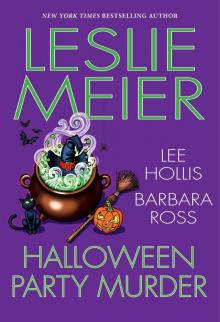 Halloween Party Murder
Halloween Party Murder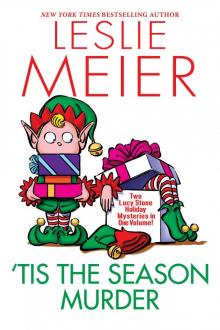 'Tis the Season Murder
'Tis the Season Murder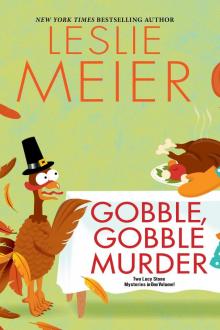 Gobble, Gobble Murder
Gobble, Gobble Murder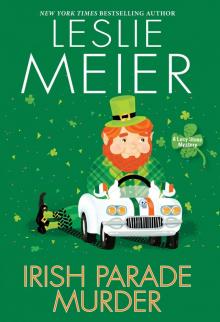 Irish Parade Murder
Irish Parade Murder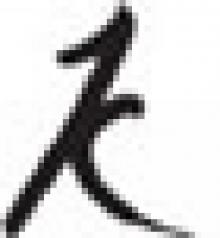 Bake Sale Murder
Bake Sale Murder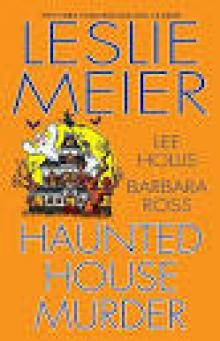 Haunted House Murder
Haunted House Murder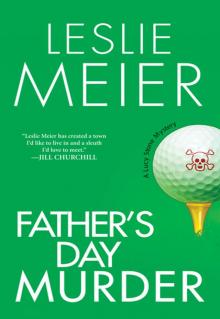 Father’s Day Murder
Father’s Day Murder Chocolate Covered Murder
Chocolate Covered Murder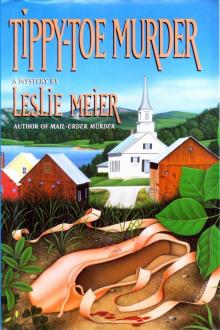 Tippy Toe Murder
Tippy Toe Murder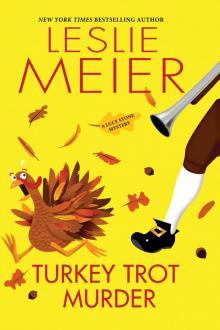 Turkey Trot Murder
Turkey Trot Murder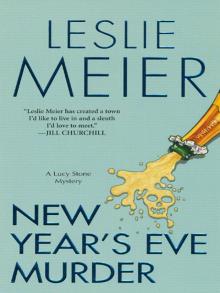 New Year's Eve Murder
New Year's Eve Murder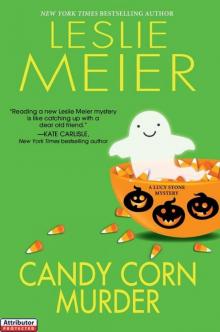 Candy Corn Murder
Candy Corn Murder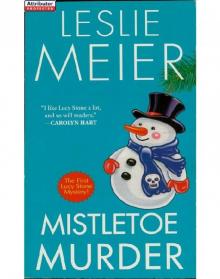 Mistletoe Murder
Mistletoe Murder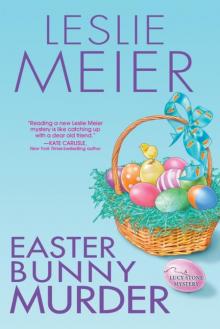 LStone 20 - Easter Bunny Murder
LStone 20 - Easter Bunny Murder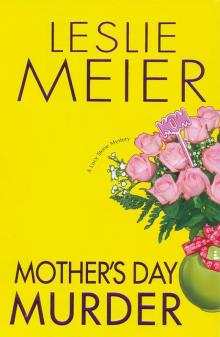 Mother's Day Murder
Mother's Day Murder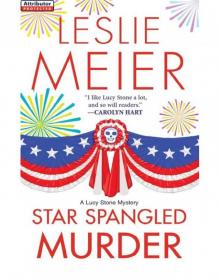 Star Spangled Murder
Star Spangled Murder Silver Anniversary Murder
Silver Anniversary Murder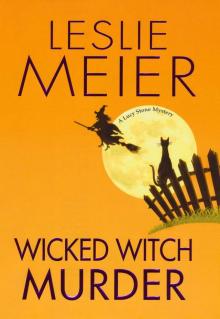 Wicked Witch Murder
Wicked Witch Murder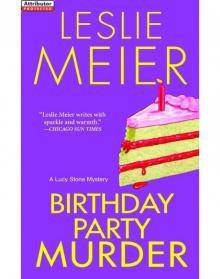 Birthday Party Murder
Birthday Party Murder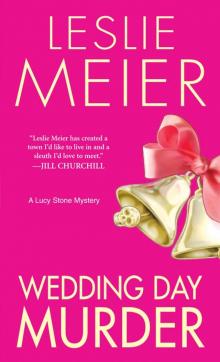 Wedding Day Murder
Wedding Day Murder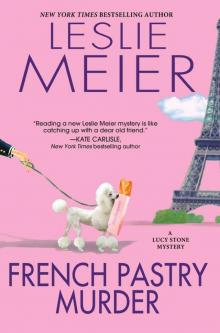 French Pastry Murder
French Pastry Murder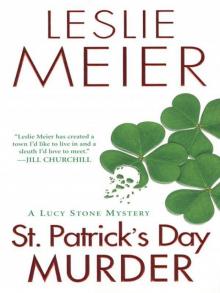 St. Patrick's Day Murder
St. Patrick's Day Murder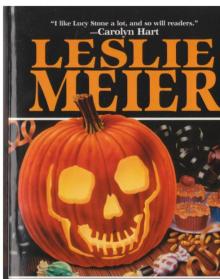 Trick or Treat Murder
Trick or Treat Murder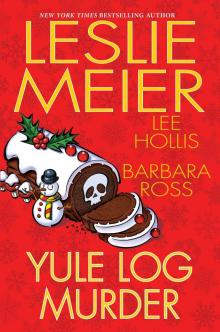 Yule Log Murder
Yule Log Murder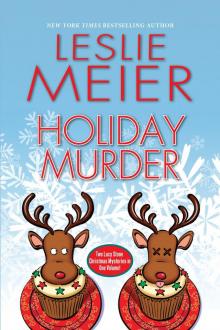 Holiday Murder
Holiday Murder British Manor Murder
British Manor Murder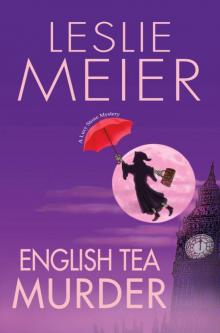 English Tea Murder
English Tea Murder